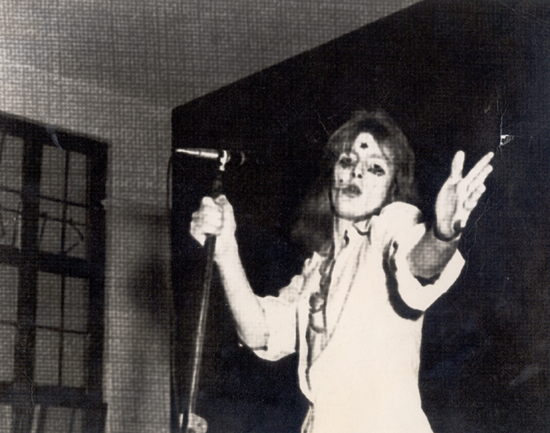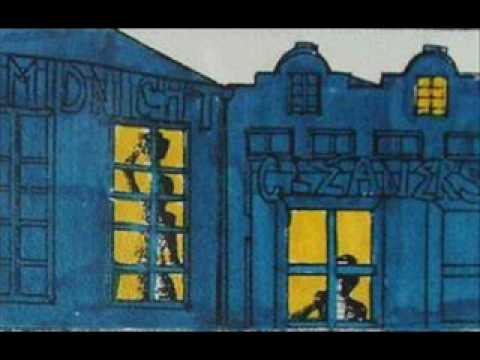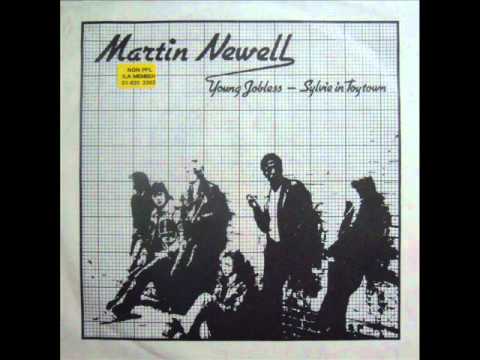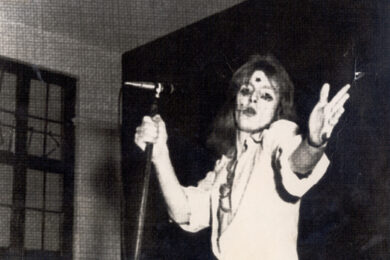Since 1980, Martin Newell has released 13 albums as The Cleaners From Venus, 7 solo records, a Brotherhood Of Lizards LP with Nelson from New Model Army (the two toured the record on bikes, with stops for busking in between gigs), a Stray Trolleys full-length and numerous EPs and singles under these various guises. He is also England’s most-published living poet, writing verse for the national papers for 20 years now, and his weekly Joy Of Essex columns for the East Anglian Daily Times were recently collected in The Stars On A Tray, with a dozen other books of poetry, two social histories, and one highly entertaining volume of autobiography, This Little Ziggy, to his name.
Ziggy takes us through Martin’s love of the 60s pop music of his youth to the exploits of The Mighty Plod, his glam band in the early 70s, whose Neo City can be found on the Velvet Tinmine compilation. Between Plod and The Cleaners, after a brief stint in the infamous punk prototype London SS, he fronted the prog outfit Gypp.
To say Martin Newell is prolific would be quite an understatement. You may not have had the pleasure of hearing some of those early Cleaners records, as they were only ever released on cassettes, available from the band or small European labels. But now for the first time ever, the original three Cleaners From Venus albums will be released on cd, vinyl and download on April 21st (Record Store Day) by Captured Tracks in Brooklyn.
Fed up with the music industry, Martin and drummer Lol Elliott took the D.I.Y. approach to its extreme, recording in their kitchen on days off (they both worked as cleaners) and distributing the tapes themselves for "£2.00 with a bit extra for postage", at one point even considering trading them for fruit and veg. The new remaster of 1981’s Blow Away Your Troubles features extra tracks, though exactly which ones these are depends on your original cassette copy as Lol would simply put on whatever 18 songs he fancied at the time until much later, when a standard track order was suggested. Blow Away Your Troubles opens with the poppy ‘Swinging London’ and moves through XTC-esque quirk pop, funk, and reggae, complete with between track banter. By the time of On Any Normal Monday (April 1982) their recording knowledge and equipment had much improved. Kicking off with the killer Night Starvation and the reissue containing the re-recorded gem Marilyn On A Train, this record moves towards the pop perfection that would be Midnight Cleaners (December 1982).
Recorded largely by Newell on his own, now using a drum machine and more synthesizers, Midnight Cleaners is a masterpiece. It opens with the gorgeous instrumental ‘This Rainy Decade’, then Martin’s love of jangly guitars shines through with ‘Time In Vain’ and ‘Only A Shadow’, the latter recently covered by MGMT. The quality of the songwriting is impressive throughout, with the beautiful ‘Corridor Of Dreams’ and Martin’s magnum opus, ‘Wivenhoe Bells II’ being particular highlights. In 1986, Giles Smith would join the band (before embarking on his more well-known career as a journalist) and Martin would once again be thrown into the mechanism of the music industry. Smith ended up singing the songs on The Cleaners 1988 German tour as Martin stayed home, protesting that he would make more money during those weeks keeping his job as a gardener.
After their deal fell through, Martin carried on writing as ever, also turning his attention to poetry, and after forming The Brotherhood Of Lizards, returned as a solo artist in 1993 with The Greatest Living Englishman, produced by XTC’s Andy Partridge. Martin has recently revived The Cleaners name for 2010’s English Electric and last year’s In Chimp World. But these – as with the stories he regaled us with of working with Partridge, Louis Philippe, Captain Sensible and John Cooper Clarke – are tales for another time, hopefully coinciding with further reissues.
The Wild Man of Wivenhoe’ shows me and my companion around the town he’s lived in since the mid-70s, having just finished his Saturday morning stint on Radio Wivenhoe. He plays us some very catchy jingles he’s written for the station, "mostly ironic 1950s retro with many animal noise effects and some music incorporated", and a few episodes of his comic mini-radio soap, Farm Shop, "involving an old aristocrat who likes old German war planes and a farm shop which mostly only sells potatoes and is subject to occasional time-slips", which can be heard on his Over The River show, 6-8 PM Thursday evenings. It all adds to the oeuvre, and as Martin looks to the future, his next project may very well feature these recordings combined with songs and more dialogue as a one-man radio programme album. But first we sat down to take a look at the past.
So what were the circumstances surrounding the first Cleaners record?
Martin Newell: When I met Lol, who is a few years younger than me, he’d been travelling around on a bus doing the Stonehenge thing with some other people. Then he settled in Wivenhoe in 1979. I did a bit of recording with him in 1980 and around that time I had my first solo single out, ‘Young Jobless’. Things went very wrong with that. I had quite a bad time over it. I got hurled head-first into the media thing where someone had said I’d been given some money to make this record criticizing the government and that it’d come from another government department. The record company hadn’t told me this and the media got in touch with me. I didn’t even have any money, I was washing up dishes in a restaurant, and suddenly I’m having all this media attention. I got mentioned on Radio 4 and things like that. Mind you, the record was played on Radio 1; that was quite thrilling. It was just very difficult for me. And then while this was going on, Lol and I started playing and I said, ‘This is a lot more fun than having a music career.’
So we started recording with a sound-on-sound tape machine, a Sony TC-630. We both worked at the same restaurant and we both had Mondays off, so that’s when we practised. We recorded the drums through a WEM Copicat with three or four inputs. We wrapped a cheap microphone in a cushion and placed a brick on it inside the bass drum and we used the lid off my old beer brewing kit, because we’d broken the snare. So basically all we had was a drum kit and a homemade bass. And we’d play about three and a half minutes of ginchy stuff and then I’d go and get a guitar and put something on that and we’d write the songs around that. Or sometimes I had a song that was halfway ready to go. Mostly, a lot of the creative stuff, the actual writing of the songs came from me. But sometimes Lol would have ideas too, quite good ones. Or sometimes the ideas were wacky, you know, too wacky even for The Cleaners. At that time Lol didn’t really play instruments actually – he played the guitar in a percussive sort of way, he’d get an electric guitar and set it up and he’d kind go chka-chk-chka-chk-chka. It did kind of work sometimes, and other times it didn’t, but it usually meant the groove was going on.
Although he really liked The Beatles, like a lot of indie musicians do now, he didn’t have the same song writing ideas that I’d grown up with. I mean, I knew that if you had a really good idea, then you got another one, that meant your best idea was your chorus and your second best one was your verse. Andy Partridge, who I worked with later, had an even better idea, he just said ‘No, then you get one that’s even better than that!’ It makes the song somewhat baroque but The Beatles did it and it took me a long time to work out how to edit things. And about one out of the two songs we did every Monday would be any good and that would comprise Blow Away Your Troubles. And I digitized them recently and I was quite surprised that some of them were, yeah, they were really good ideas.
I could play piano a bit, I could play guitar, I could write songs, I’ve always been able to write songs since I was 14 or 15. Sometimes my fellow band members regarded it as sort of a miracle. I always took it for granted. When I first had a guitar and I learned 3 chords, I didn’t think ‘Let’s learn a fourth chord’, I thought ‘Let’s write a song.’ I thought that if I wrote the songs, then that would somehow be the key to things. And I was just interested in writing songs, I wasn’t interested in being a great musician. But I realized that if I learned chords, I’d probably write more intricate songs. People were flabbergasted sometimes. You know, they said, ‘How…how did you do…?’ It was this constant writing of songs. I just thought it was something that everybody could do, and I didn’t realize that it was a separate sort of talent. Like I’ve never been able to play like an Eric Clapton, I know a few tasty licks, but I know more like jangling stuff. That’s what I would do… Mr. Jangle! [laughs]
Feature continues after photograph
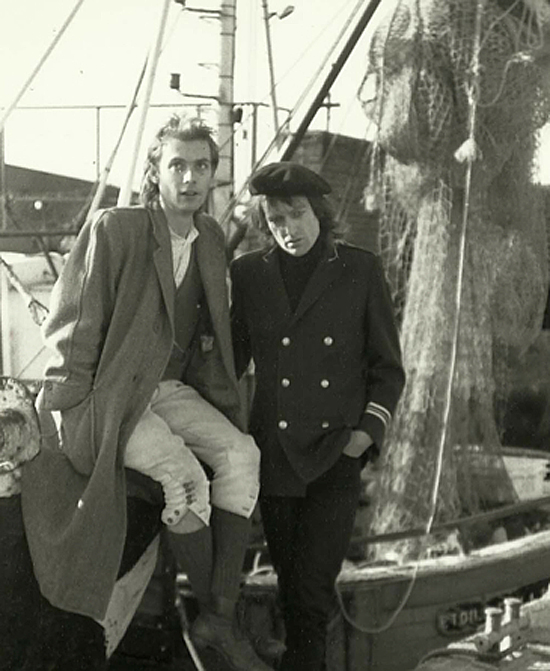
Do you see a progression from Blow Away Your Troubles through On Any Normal Monday to Midnight Cleaners? Because although it’s all pop, I see Blow Away Your Troubles as a bit more quirky in places, you have a bit of funk, a little bit of reggae but then by the time you get to Midnight Cleaners, to me, that’s a pure pop album.
MN: Yeah. Lol had pretty much left by that point. He left me with a few drumbeats. He left because he was courting a girl in Bath at the time. He was spending more and more time there and eventually he just didn’t come back. And I had run out of drumbeats by then! I’d corner him on the way back to Bath and say, ‘Lol. Kitchen!’ We had this old, abandoned kitchen. I’d hang one mic up and put one in the drums and tape another just under the snare drum. But by the time we got to Any Normal Monday, although he helped out with certain things, his heart was in Bath. I think there’s maybe a couple of things on Midnight Cleaners that are his. Out of desperation I started using a drum machine on Midnight Cleaners.
Midnight Cleaners has some shockingly good stuff on it actually. I hadn’t listened to it for years, and I listened to it and I thought, ‘This is actually alright!’ I hadn’t listened to it for decades. When I went and digitized those three albums, I was thinking I actually had better ideas in those days but I didn’t know how to execute them so I did them very haphazardly. But the whole concept sounds good. It was Burger Records that woke me up to this. Burger in California put out the cassettes as the cassettes.
And they’re going to do the further re-issues?
MN: I’ve digitized two more and I’ve sent them stuff. I haven’t received a reply from them yet but I assume they’re getting on with them. I think they’re a bit kind of like the record company equivalent of what The Cleaners were. But I liked their whole idea. They’ll take 3 LPs, make 250 cassette copies, that’s it. Then they move on to something else.
Rian Fossett from Captured Tracks is great. She’s a real enthusiast, she’s the one who persuaded me to do this. At first I told them to fuck off. Which is kind of what I do. And then Rian got in touch. I got the impression that she’d listened to the stuff, that she knew the stuff. And I thought ‘This is stupid! I’ve got this oxide up in my loft, and there are people who wanna listen to it and there’s someone offering to actually do a good job of putting it out, in limited quantities, 1000 cds and 1000 vinyls and downloads of each of three albums.’ I’m quite impressed with them.
Feature continues after photograph
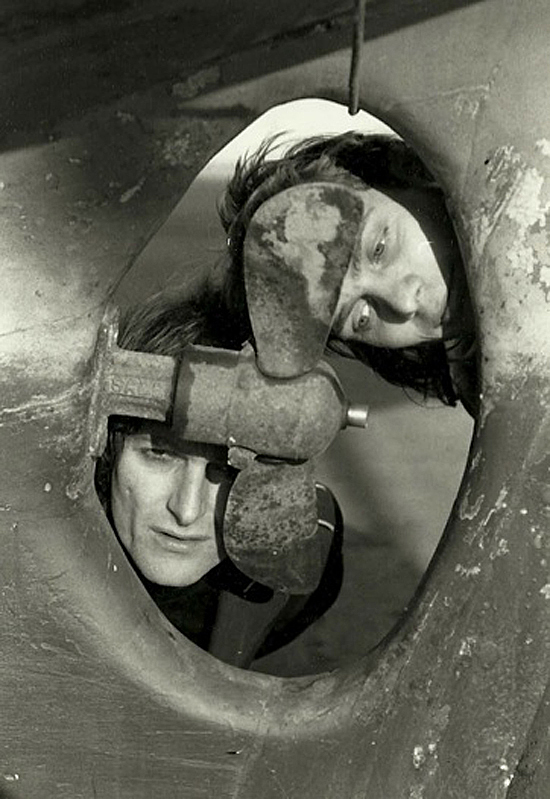
What were your reasons for holding back? It’s been 30 years…
MN: Well, because I’ve been in the music industry for all that time, I haven’t just got off the banana boat. And because I had lots of money stolen from me when I was younger. They just don’t pay you, they say ‘Oh, I’m sorry, there’s no money.’ And you’re thinking ‘But we’ve just been chased by girls in Japan! Or applauded by 1500 people in Germany and some of them bought records, we know they did. They were singing our songs when we got to Berlin, we must be a bit known! Why isn’t there any money?’ And they say ‘Well, there just isn’t, we’ve had to use it in…’ That’s what they do to musicians. They just think you wanna be there because you want loads of drugs and chicks and people clapping you. And for many musicians that is enough. But once you start having to feed the dogs or pay your rent, you think ‘hang on a minute, I’m a bit tired, this is actually work and I’d like to be paid for it.’ I cannot, off hand, think of another industry in existence where such business practices are observed because you couldn’t get away with it in say the steel industry or the IT industry, people would need to be paid. And I figured out after many years that the reason they do get away with it is because the raw material, the raw talent, the young flesh, hurls itself willingly into the machine because it’s hypnotized by fame. And fame is the first thing. The kind of ‘Mummy, you’re not watching me’ factor taken to its extreme. Where you finally say (gruff, frazzled voice) ‘Look, I will show you, I will go on television, then you’ll see! Look at me! I’m on television going like this! Now you believe how great I am.’ And of course, yeah, the girls will come and go around with you for a while probably. And then when you don’t get any money, that’s no good, is it?
Do you think the internet has changed that for the better because nowadays people can start their own websites and take more control?
MN: Yes, it has. It really has. But on the other hand, there’s now a morass of people at the bottom of the process all going (Munchkin accent) ‘Me! Me! I’m brilliant! I’m brilliant!’ and the record companies are using that as a filtration process. But as long as young people, hungry for fame and attention, and very keen on music with loads of energy, are willing to go make music, older, more arch men – and it will usually be men – will find ways of stealing the money from them. That’s just how it is. It’s interesting that after behaving so appallingly for decades, that the music industry has had a spanking and is being closed down. I suspect they’ve just moved on to behave badly somewhere else. Possibly in film or DVD, I don’t know. And they’re still out there. I make my life easy by simply not meeting them and not going on tour. I don’t want to meet them, why would I? I’m in my late-50s, why would I want to go and meet a bunch of people who use words like ‘awesome’ and ‘global’ every five minutes?
So what was it like going back and listening to the old tapes?
MN: A real surprise. I thought they were high standard, I thought if a band had presented me with this, I’d have probably thought ‘Oh god, that sounds a bit cheap’ or whatever but I’d have probably been surprised by the songs and the harmonies. There were good ideas in there. Good ideas went into it. I was still in my 20s when I did those three. Not that long from Plod. Plod and Gypp and those early Cleaners things, they all happened in 10 years.
What about the tape distribution? You’d just record them and then send them to whoever wanted them?
MN: We put them on tapes, and the story is well-known about Lol stealing the tapes and getting caught for shoplifting and I said ‘look Lol, why don’t we just get a load of cheap ones and sell them for enough to cover it, how about that?’ Cause I didn’t want to be arrested again. I wasn’t arrested but Lol was. I’d been through that sort of being arrested for things when I was much younger, as I talk about in This Little Ziggy, so I just didn’t want any trouble really. How did we distribute? We got 50 copies made and sold them and got a bit of money and we sold some more and that’s all we did. It wasn’t a big operation or anything. There was a guy in Germany called Joachim at Jar Music and he would sometimes take a master from us and he’d sell some and then send me money, and he always sent the money. And I met him and we had a good long friendship with him. Joachim of Jar Music and a bloke called Rudi Tüscher who was at Calypso Now, which is how most of the tapes got to America.
The making of On Any Normal Monday, had anything changed (from Blow Away Your Troubles)?
MN: Yeah, we got a 4-track Portastudio then. Which I had to work in a restaurant doing a load of night shifts for.
Did the name of that record come from the fact that you recorded on Mondays?
MN: Yeah, Lol liked the idea. I have an ear for such things, we were probably in the pub, ‘Well, you know on any normal Monday we’d be at – that would be a good album title, we’ll use that, ‘on any normal Monday’’ and Lol liked that as well. Cause Mondays weren’t normal. Mondays were anything but normal for us. Because neither of us worked so anything could happen.
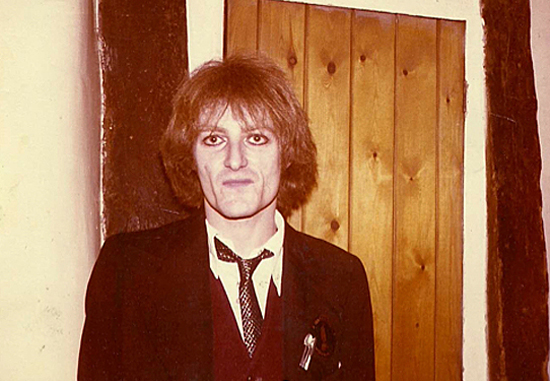
Why did you decide to re-record ‘Wivenhoe Bells’ and ‘Marilyn On A Train’?
MN: ‘Marilyn On A Train’ got damaged. It was actually damaged. It was a great idea that got damaged by too much use, it was very hissy, it wasn’t very good. I thought we could do a better version of it, I was already beginning to get a bit more quality boost. ‘Wivenhoe Bells’ was really a rough demo, it was just me (starts stomping on floor) doing that and playing the piano and I always meant to do it properly so I did. I wanted to make a bloody opera out of that one. And I did. It took me ages to do the Wivenhoe Bells that’s on Midnight Cleaners. That was a work of art, that. I mean I put so much on it, and having to cram all the things on a little 4-track cassette format Portastudio. It was made in my low-rent, garden shed, Phil Spector-phase. I was obsessed with it. I’d be over it on a whole weekend. I think it took me a weekend and a few days to finish that. Lol wasn’t there. He was waiting for a phone call. So I just put (makes phone ringing sounds) on the song to remind Lol that he hadn’t been there for one of the possibly greatest songs we’d done.
Night Starvation is another of my favourites. Just a great pop song.
MN: That’s great. Yeah, that one I like. Lol came in when I’d finished mixing and said ‘Wow, that sounds really great!’ So we knew we’d had a quantum leap then from what was going on in Blow Away Your Troubles.
In other interviews you’ve said you weren’t listening to much back then. But in Giles’ book (Lost In Music) he says when he would visit you at work you’d often stop, nod to the radio, and say ‘Now that’s a really good song’.
MN: I listened to the radio, yeah. But what I listened to while I was making those records… I mean I hadn’t heard much XTC. Lol liked them. And I only knew Giles vaguely at that point. I would probably have been listening to The Beatles, to The Ronettes, again, listening to them again because I hadn’t heard them for a while. And to quite a lot of punk rock. That’s what I listened to. Vini Reilly, Durutii Column, I remember that being played a lot.
Had you left all the sort of glam stuff behind by that point? Were you no longer listening to Slade and…
MN: There wasn’t a lot of it at the time. You have to understand, during the glam period, since we were part of it, it was going on everywhere all the time, it was the hit parade, it was the charts. So you didn’t necessarily play it at home. About 73/74 – and that was a good year for Plod – we were listening to Steely Dan. Steely Dan’s second album, Countdown To Ecstasy, which we thought was great. And I was listening to some French stuff as well. I was listening to a bloke called Léo Ferré. I would listen to Rory Gallagher, and I found out that Captain Sensible and Andy Partridge are all big Rory Gallagher fans. I listened to Mick Ronson a lot! That was the album that I listened to all the time, Slaughter On 10th Avenue, I would play it over and over again.
What I really loved about This Little Ziggy was that this joyous love of pop music really came across, especially the 60s stuff that you grew up with.
MN: Yeah, yeah, yeah. That’s what I liked.
Who were your favourites?
MN: I still play them. I’m re-listening to them on CD. The Hollies – especially before Graham Nash left. The Move, The Small Faces I haven’t managed to recapture The Kinks because it is still all on vinyl. My whole collection is all spread across different media. So I don’t have Kinks to play on the radio show. I’ve gotta sort that out somehow. There’s Something Else and Kinda Kinks, which I’ve got.
What do you think of MGMT’s version of ‘Only A Shadow’ (from Midnight Cleaners)?
MN: It’s very flattering because it’s kind of like ours. I’ve been in touch with Andrew VanWyngarden, we’ve exchanged emails a couple of times, since then.
What about the extra songs that are coming out on these reissues? You just found them?
MN: Yeah. I just found them, I thought ‘Well, this should’ve gone on.’ Because when we made the original Blow Away Your Troubles it wasn’t crystallized to any one form. Lol would dig all these tapes out and he put whatever songs came to him. We did 40 songs and we could only get something like 18 on each cassette so Lol put the first 18 he found and everyone got a different Blow Away Your Troubles. Until I said we ought to standardize it really. So we made two master cassettes from the reels and that became the accepted Blow Away Your Troubles. But prior to that, lots of people must have a different idea of what’s on there. There was one song called ‘Look At The Wall’, I don’t know what happened to that, and there was another one called ‘The Meltdown Watusi’ that’s rather good. Lol’s got a copy of that somewhere but none of his tape stuff is working.
Any plans to follow-up This Little Ziggy with any more autobiography?
MN: Yeah, I’ve started one actually. But I’m not doing it like I did with Ziggy, I had an advance for that and there was a chance to speed it up and do it. I should really continue with it. I did quite a bit last year and the year before. Let’s have a look, cause there is a file in here with Ziggy 2 somewhere. [He goes to computer, shows us what looks like quite a bit of work.] Greece, Going To Greece, Punk V. Prog, It’s Going To Be There Forever, Summer of 75…
You’ve picked up where Ziggy left off.
MN: Yeah. [Clicking through files.] Another about the history of Denmark St. I think it’s going to run from 1975 til 1990. And the next bit would run after that. But I better get me skates on or I’m gonna be dead. I don’t want that. Well no, who would? (laughs)
Feature continues after photograph
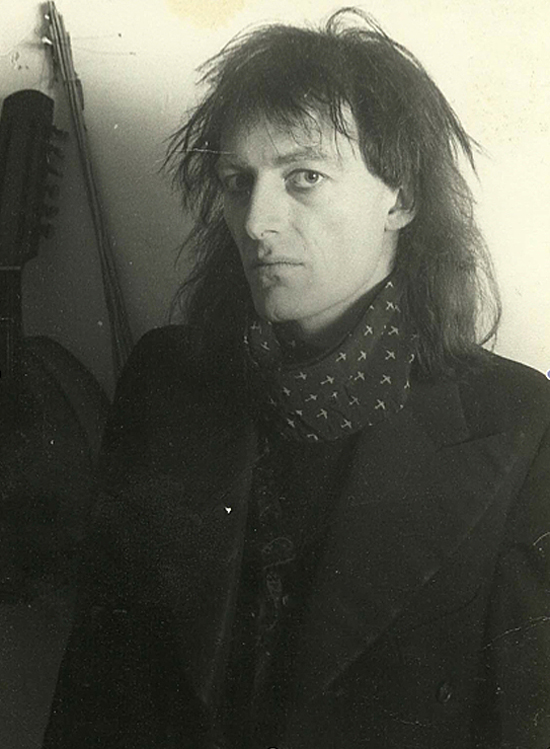
What are you doing next? A new record?
MN: Well that I have to think about. I’m thinking because no energy is ever wasted, when I threw my lot in with this radio station I thought it’d be a fun thing to do. And they’ve drawn me in more and more. So I have this broadcast right, and what it’s taught me is that those jingles, they’ve really got something. I really like doing them and I really like doing Farm Shop. I’m writing a column for the East Anglian, I’m writing for the Suffolk Magazine, I’m writing poems for The Sunday Express and increasingly doing reviews as well. I just reviewed Andrew Motion’s book for them. I’m always amazed when the literary editor gets back and says ‘That was really well written, thank you.’ [laughs] Even after 20 years I don’t expect it because I came from a yobbo-rock band and I didn’t think that any of this would happen to me.
I don’t know what I will do. But I won’t do nothing. I’ll record. I’m thinking of how can I combine this Farm Shop, those silly commercials, some songs, put them all together like it’s a radio program except I’m playing all the parts and I’m the DJ and the jingle-maker and the musicians as well. I have to go outboard a bit to record the songs. I’ve got some good ideas for songs. But I’m thinking maybe only half a dozen songs and the rest of it can be sketches, but how do they work? How do they knit together? I’m not planning to do a book because I’ve just done one (The Stars On A Tray). I’m not exactly sure what I’ll do. But it won’t be nothing. I think an album, definitely an album. And soon, as the sun comes out, you know it’s something, the sun hits my pineal gland these days and I start doing songs. I’ve got some really stunning ideas.
I always say that there’s something about a really great song that’s similar to the feeling you have after you first kiss with someone you’ve really fancied for a while. So what do you think is inherent in all great pop music?
MN: [Starts tuning up guitar] Well firstly, there’s the curious feeling, when you hear a really great pop song, that you’ve heard it before. And sometimes writers get that. Paul McCartney had it with ‘Yesterday’, do you know that story? He was living at Jane Asher’s place, her dad was a doctor in Wimpole Street, and they had a nice big townhouse there and he moved in, they gave him his own room there, this would’ve been in the mid-60s, so he could be in London but slip quietly in and out, no one would know he was there kind of thing. He had his own room with a piano in it. And he woke up one day with this idea and it all came out like in one lump like a great song does [sings melody] and he called it ‘Scrambled Eggs’ originally. I heard him sing a snatch once ‘Scrambled eggs, oh my darling you’ve got lovely legs’, something like that, that’s what it originally was. But the song seemed so familiar to him that he went round singing it to people for a couple of days saying ‘Who wrote this?’ [Sings melody again] And they said ‘I don’t know. Never heard it before. You probably. You’ve probably written it.’ He said, ‘Can’t be. No, I know this.’ And I think there comes a point, well I don’t know if you know about time spectrums or circular time or time on a spiral, that he recognized something from the future, that somewhere in the time spectrums ‘Yesterday’ probably always already existed and he just kind of in the past dreamed it in the future… I’ve had one or two similar experiences unfortunately never with such a strong song as that. Occasionally songs just won’t leave you alone. I think it was either Vivian Ellis or Vaughan Williams who said ‘Only write the stuff that won’t leave you alone.’ You know, the stuff that won’t stop going through your head. I have somewhere in here [tunes guitar] this’ll be Billy Liar when I finish it.
Like the film?
MN: Yeah. It’s a brilliant film, isn’t it? It’ll be about getting on a train, the whole thing about where you’re watching at the end and there’s Julie Christie, there’s Billy, there’s the train to London, there’s the future opening up and he thinks ‘I’ve got to go and get a packet of milk’. And you’re just saying, ‘Excuse me, Julie Christie, on a train, waiting for you?! GET ON THE TRAIN!’ I haven’t written the lyrics yet but part of the chorus goes –
[plays us about a minute of Billy Liar on acoustic guitar, humming vocal melody before singing chorus of ‘Get on the train’ then singing main guitar riff. I must say it’s one of the best pop songs I’ve heard in years]
And that’s what it’ll do. And that will take the world apart, that song. I know it will. Everything in it is good, I just haven’t got around to the lyrics to it yet. But I know what they’ll be. But I have songs. They are there, ready to go. And I really should start recording them. The radio station’s been taking up an awful lot of time but it’s a really good thing to do and I’ve learned how to use Audacity, how to make commercials, and this will add to the sum total of everything I do. I’ve got all bits of spare tracks knocking about…
My standard last question is – Say you had stolen a space shuttle and were flying it directly into the sun, for whatever reason you had. What would you want the soundtrack to be?
MN: [exhales heavily] That would be quite hard. I don’t know, I really don’t know… There are some tracks that I play all the time at the moment. I mean, it would really, really change depending on the day. It has to be said, one perennial favourite of mine is Led Zeppelin’s ‘Babe I’m Gonna Leave You’. That’s pretty good. I’m just trying to think what bit of it you’d want to crash into the sun, cause it’d have to be really fast, wouldn’t it? Cause you wouldn’t want to sort of gradually fry, would you? You’d want to suddenly just burst into – [starts playing heavier part of ‘Babe I’m Gonna Leave You’ on the acoustic guitar]. That bit, yeah, that’d be good. That would work. Or even [Cleaners From Venus song] Julie Profumo. (laughs) That’d be pretty good. Or The Green-Gold Girl Of The Summer.
I thought you were going to say if you could get a time machine where would you go back to? Who would you be? I’ve often thought who would I be if I had a time machine if you could be someone, just for a summer or whatever a season was. I don’t know, probably Paul McCartney in London in 1965. Keith Richards in 1968 at the making of Beggars Banquet, that must’ve been good. Yeah, the way he looked and everything, he just looked fucking great, you know. I mean I had my moments when I was younger and I’d have to say well would I rather look like Keith Richards then if I would look like Keith Richards now, that would be the trade-off, and I’ve have to say No. I’m getting to be quite a reasonable-looking old man now, my face isn’t falling apart yet, you know we’ve lost some hair and we’ve gone a bit grey but… Now Keith Richards at certain times, you know he’s just rock & roll distilled, isn’t he? He’s where the whole British rock & roll thing came from. And he just looks wonderful. You know, The Beatles don’t look bad but Keith Richards at that time, say about 1972, on The Stones tour, cigarette drooping from mouth, stripey trousers, white shirt just there and loads of bangles and everything… My desert island Stones’ record would have to be either Between The Buttons or Beggars Banquet’s pretty good. I quite like Goat’s Head Soup as well. One side of that is really good. ‘Dancing With Mr. D.’ I still like it a lot but, you know, rock & roll, you get men sitting in pubs having long bearded conversations about it. When they start talking about things like Little Feat and all that, I find that really boring. That was going on in my generation, pre-punk, everyone was talking about Little Feat, The Doobie Brothers, Lowell George, you know, Stanley Clarke and all that stuff, and I’m thinking I’m just not interested in this! I’m very interested in anything that’s about 3 minutes long and slightly distorted with a good chorus, that’s what I like. And I still am.
Blow Away Your Troubles (2LP, CD, MP3), On Any Normal Monday (LP, CD, MP3), Midnight Cleaners (LP, CD, MP3) and a box set containing of all 4 LPs will be released by Captured Tracks on April 21st for Record Store Day

